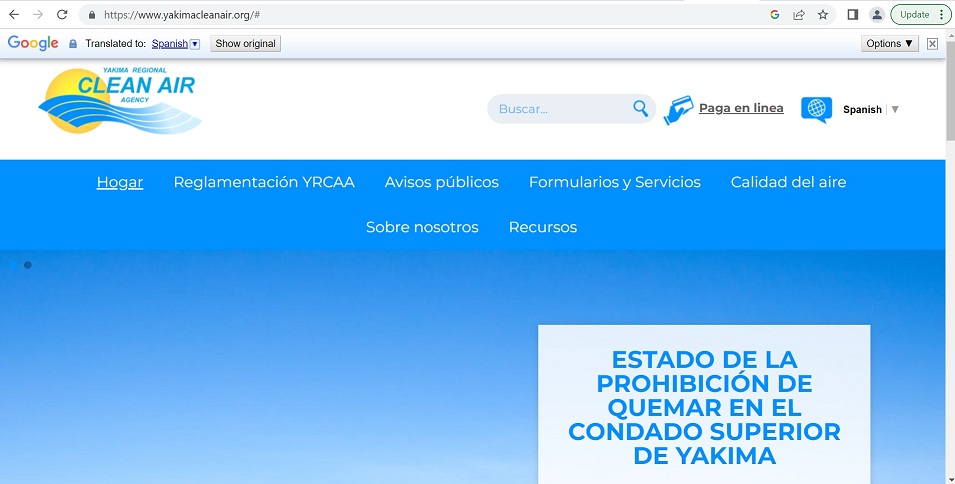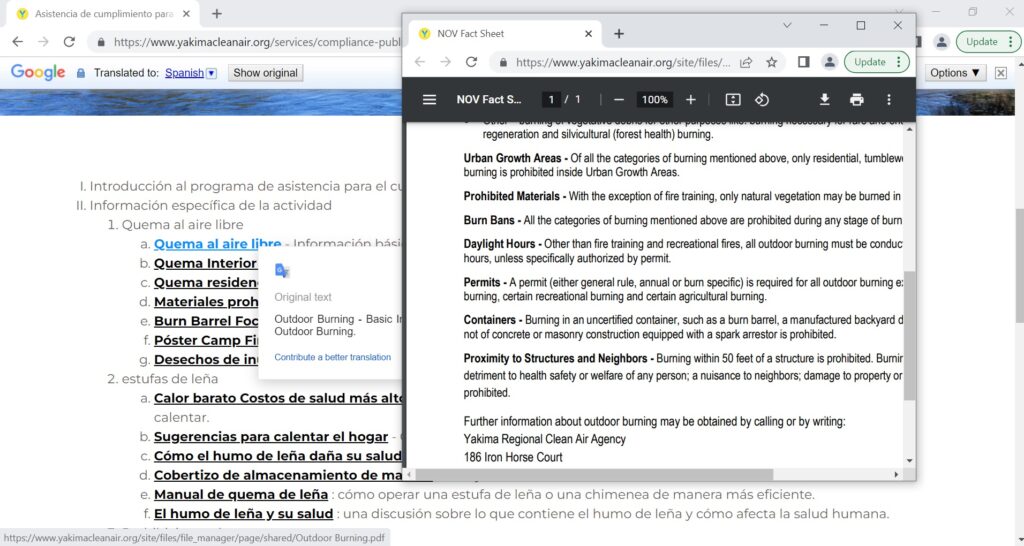
Nonprofit asks EPA to investigate the Yakima Regional Clean Air Agency
Listen
(Runtime 1:33)
Read
A nonprofit organization, Friends of Toppenish Creek, is asking the U.S Environmental Protection Agency (EPA) to reopen a complaint against the Yakima Regional Clean Air Agency (YRCAA.) The environmental advocates claim the clear air agency, “does not adequately engage those with Limited English Proficiency” and refers to Spanish-speaking communities in particular. But, YRCAA says it has taken action to serve those underserved populations.
In February and March this year, Friends of Toppenish Creek sent letters to the EPA External Civil Rights Compliance Office (ECRCO) asking the EPA to investigate YRCAA for, “discrimination based on race, color, and national origin.”
In the complaint letters, the nonprofit asked the EPA to reopen a 2019 complaint against the Yakima Regional Clean Air Agency, that was resolved after the YRCAA signed an Informal Resolution Agreement Letter with the EPA.
ECRCO closed that complaint in 2020, writing it had, “determined that the YRCAA has complied with the terms of the IRA signed on August 9, 2019.”
The Yakima Regional Clean Air Agency also published a Non-Discrimination Plan in 2020, which included a language access plan.
Jon DeVaney is the YRCAA Board Chairman, Representative at Large. He said Friends of Toppenish Creek has issued complaints in the past, including about issues of language access.
“That did result in some additional requirements for more documents on the agency’s website, and also just paper documents available to members of the public being available in a translated format”, said DeVaney.
For Friends of Toppenish Creek Executive Director Jean Mendoza, the issues have not been completely resolved.
“The Clean Air Agency said that they had hired a certified translator. They do not have a certified translator on staff. They said they would translate documents into Spanish. So, what they did on their website [is] they installed an automatic translator from English to Spanish,” said Mendoza.
According to DeVaney, after the 2019 complaint, the YRCAA had discussions with the EPA External Civil Rights Compliance Office about hiring a certified translator, but not every agency is required to have a full-time certified translator on staff.
“The law does not require that very small agencies have a dedicated employee who can handle that at all times. It may be by arrangement instead of on-call, but we do have staff who are able to provide general bilingual services to accommodate customers,” said DeVaney.
Mendoza said language barriers create difficulties when Spanish-speaking communities need to respond to environmental problems.
“If people can receive information in their own language — in this case, Spanish — it’s much easier for people to understand the issue and to formulate opinions and to articulate those opinions. We think this is very important,” said Mendoza.
The Friends of Toppenish Creek’s letter includes eight points of complaint. Among them, “the YRCAA does not provide information to the LEP [Limited English Proficiency] community that is necessary for participation in important decision making. There are upcoming policy decisions that will have long lasting impacts on Yakima County.”
DeVaney said, overall, he thinks the language accessibility for all members of the community who call or go to the YRCAA office is, “quite strong”.
In the letters of complaint, the Friends of Toppenish Creek write, “The YRCAA does not translate educational and legal documents that members of the LEP community are likely to encounter during routine interactions with the agency”.
“The YRCAA holds community forums at 2 PM on Mondays when the Spanish-speaking population is most likely at work and unable to attend. Recordings of the meetings are not translated into Spanish,” the complaint letter also says.
The complaint letters also make detailed reference to information contained on the YRCAA website. “The YRCAA Regulation 1 is the legal document that describes how the YRCAA performs the agency duties under the EPA approved WA State Implementation Plan (SIP). When a Spanish speaking person [tries] to access this document on the Spanish language Reglamentación YRCAA web page, he/she is linked to a copy of Regulation 1 in English.”

While the YRCAA uses a Google automatic translator on its website to translate information, internal documents are in English. (Screenshot from YRCAA website.)
“The YRCAA website has a page entitled ‘Compliance Assistance’ or ‘Asistencia de complimiento para el público en general’” the letter continues. “Each link connects the reader to an information sheet in English only.”
Similarly, the nonprofit’s letter goes on to note, “The YRCAA website has a page entitled “Forms and Registration” or “Formularios y registro”. Forty forms are posted on this page with titles in English and Spanish, but the forms are only in English.”
When asked about the untranslated documents, DeVaney said every level of government struggles to translate every document it publishes.
“This agency is fairly small — it’s less than a dozen staff. So having the ability to have every technical document fully and professionally translated is a challenge,” he said.
He also said the YRCAA has, “bilingual staff available to answer questions and explain to any members of the public who are not able to read that information in English and need it explained in Spanish.”
DeVaney says YRCAA is waiting to see if the EPA External Civil Rights Compliance Office has any further feedback on things that may need to be changed.
The complaint letter written by the Friends Toppenish Creek also said, “The YRCAA does not inform the Spanish speaking population about opportunities to nominate someone from the Spanish speaking community to serve as a member at large on the YRCAA Board of Directors.”
That complaint includes a link to an August 2022 email from Friends of Toppenish Creek’s Executive Director Jean Mendoza, in which she applied to serve on the YRCAA Board.
Mendoza also mentioned that the organization had requested that someone from South Yakima be a part of the search team for the YRCAA executive director. “In 2021, the Clean Air Agency began the process of searching for and hiring a new executive director. And when they did that, Friends of Toppenish Creek asked them to include somebody from South Yakima County on the search team. [The] Clean Air Agency Board of Directors declined to do that,” she said.
In response to complaints about YRCAA providing a higher level of services to the northern Yakima Valley population and not adequately engaging Limited English Proficiency communities who predominantly live in the southern part of the valley, DeVaney said there’s a very substantial Spanish-speaking Latino population in the upper valley as well.
“The agency’s responsibility is to monitor and meet federal air quality criteria throughout the county,” he said. “We’re monitoring in all areas and trying to meet those broad regulatory goals in all areas of the county. The air doesn’t stay in one place. It moves around and everyone in the communities affected by general air quality.”
It is now up to the EPA to determine whether to investigate the complaint.















